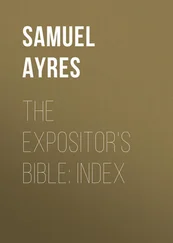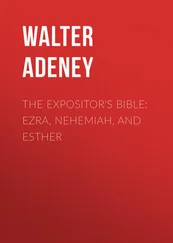Robert Alexander Watson - The Expositor's Bible - Judges and Ruth
Здесь есть возможность читать онлайн «Robert Alexander Watson - The Expositor's Bible - Judges and Ruth» — ознакомительный отрывок электронной книги совершенно бесплатно, а после прочтения отрывка купить полную версию. В некоторых случаях можно слушать аудио, скачать через торрент в формате fb2 и присутствует краткое содержание. Издательство: Иностранный паблик, Жанр: foreign_prose, foreign_religion, Философия, foreign_psychology, foreign_antique, на английском языке. Описание произведения, (предисловие) а так же отзывы посетителей доступны на портале библиотеки ЛибКат.
- Название:The Expositor's Bible: Judges and Ruth
- Автор:
- Издательство:Иностранный паблик
- Жанр:
- Год:неизвестен
- ISBN:нет данных
- Рейтинг книги:5 / 5. Голосов: 1
-
Избранное:Добавить в избранное
- Отзывы:
-
Ваша оценка:
- 100
- 1
- 2
- 3
- 4
- 5
The Expositor's Bible: Judges and Ruth: краткое содержание, описание и аннотация
Предлагаем к чтению аннотацию, описание, краткое содержание или предисловие (зависит от того, что написал сам автор книги «The Expositor's Bible: Judges and Ruth»). Если вы не нашли необходимую информацию о книге — напишите в комментариях, мы постараемся отыскать её.
The Expositor's Bible: Judges and Ruth — читать онлайн ознакомительный отрывок
Ниже представлен текст книги, разбитый по страницам. Система сохранения места последней прочитанной страницы, позволяет с удобством читать онлайн бесплатно книгу «The Expositor's Bible: Judges and Ruth», без необходимости каждый раз заново искать на чём Вы остановились. Поставьте закладку, и сможете в любой момент перейти на страницу, на которой закончили чтение.
Интервал:
Закладка:
Othniel the first of the judges seems one of the best. He is not a man of mere rude strength and dashing enterprise. Nor is he one who runs the risk of sudden elevation to power, which few can stand. A person of acknowledged honour and sagacity, he sees the problem of the time and does his best to solve it. He is almost unique in this, that he appears without offence, without shame. And his judgeship is honourable to Israel. It points to a higher level of thought and greater seriousness among the tribes than in the century when Jephthah and Samson were the acknowledged heroes. The nation had not lost its reverence for the great names and hopes of the exodus when it obeyed Othniel and followed him to battle.
In modern times there would seem to be scarcely any understanding of the fact that no man can do real service as a political leader unless he is a fearer of God, one who loves righteousness more than country, and serves the Eternal before any constituency. Sometimes a nation low enough in morality has been so far awake to its need and danger as to give the helm, at least for a time, to a servant of truth and righteousness and to follow where he leads. But more commonly is it the case that political leaders are chosen anywhere rather than from the ranks of the spiritually earnest. It is oratorical dash now, and now the cleverness of the intriguer, or the power of rank and wealth, that catches popular favour and exalts a man in the state. Members of parliament, cabinet ministers, high officials need have no devoutness, no spiritual seriousness or insight. A nation generally seeks no such character in its legislators and is often content with less than decent morality. Is it then any wonder that politics are arid and government a series of errors? We need men who have the true idea of liberty and will set nations nominally Christian on the way of fulfilling their mission to the world. When the people want a spiritual leader he will appear; when they are ready to follow one of high and pure temper he will arise and show the way. But the plain truth is that our chiefs in the state, in society and business must be the men who represent the general opinion, the general aim. While we are in the main a worldly people, the best guides, those of spiritual mind, will never be allowed to carry their plans. And so we come back to the main lesson of the whole history, that only as each citizen is thoughtful of God and of duty, redeemed from selfishness and the world, can there be a true commonwealth, honourable government, beneficent civilization.
VI.
THE DAGGER AND THE OX-GOAD
The world is served by men of very diverse kinds, and we pass now to one who is in strong contrast to Israel's first deliverer. Othniel the judge without reproach is followed by Ehud the regicide. The long peace which the country enjoyed after the Mesopotamian army was driven out allowed a return of prosperity and with it a relaxing of spiritual tone. Again there was disorganization; again the Hebrew strength decayed and watchful enemies found an opportunity. The Moabites led the attack, and their king was at the head of a federation including the Ammonites and the Amalekites. It was this coalition the power of which Ehud had to break.
We can only surmise the causes of the assault made on the Hebrews west of Jordan by those peoples on the east. When the Israelites first appeared on the plains of the Jordan under the shadow of the mountains of Moab, before crossing into Palestine proper, Balak king of Moab viewed with alarm this new nation which was advancing to seek a settlement so near his territory. It was then he sent to Pethor for Balaam, in the hope that by a powerful incantation or curse the great diviner would blight the Hebrew armies and make them an easy prey. Notwithstanding this scheme, which even to the Israelites did not appear contemptible, Moses so far respected the relationship between Moab and Israel that he did not attack Balak's kingdom, although at the time it had been weakened by an unsuccessful contest with the Amorites from Gilead. Moab to the south and Ammon to the north were both left unharmed.
But to Reuben, Gad and the half-tribe of Manasseh was allotted the land from which the Amorites had been completely driven, a region extending from the frontier of Moab on the south away towards Hermon and the Argob; and these tribes entering vigorously on their possession could not long remain at peace with the bordering races. We can easily see how their encroachments, their growing strength would vex Moab and Ammon and drive them to plans of retaliation. Balaam had not cursed Israel; he had blessed it, and the blessing was being fulfilled. It seemed to be decreed that all other peoples east of Jordan were to be overborne by the descendants of Abraham; yet one fear wrought against another, and the hour of Israel's security was seized as a fit occasion for a vigorous sally across the river. A desperate effort was made to strike at the heart of the Hebrew power and assert the claims of Chemosh to be a greater god than He Who was reverenced at the sanctuary of the ark.
Or Amalek may have instigated the attack. Away in the Sinaitic wilderness there stood an altar which Moses had named Jehovah-Nissi, Jehovah is my banner, and that altar commemorated a great victory gained by Israel over the Amalekites. The greater part of a century had gone by since the battle, but the memory of defeat lingers long with the Arab—and these Amalekites were pure Arabs, savage, vindictive, cherishing their cause of war, waiting their revenge. We know the command in Deuteronomy, "Remember what Amalek did unto thee by the way, when ye were come forth out of Egypt. How he met thee by the way and smote the hindmost of thee, even all that were feeble behind thee. Thou shalt blot out the remembrance of Amalek from under heaven. Thou shalt not forget it." We may be sure that Reuben and Gad did not forget the dastardly attack; we may be sure that Amalek did not forget the day of Rephidim. If Moab was not of itself disposed to cross the Jordan and fall on Benjamin and Ephraim, there was the urgency of Amalek, the proffered help of that fiery people to ripen decision. The ferment of war rose. Moab, having walled cities to form a basis of operations, took the lead. The confederates marched northward along the Dead Sea, seized the ford near Gilgal and mastering the plain of Jericho pushed their conquest beyond the hills. Nor was it a temporary advance. They established themselves. Eighteen years afterwards we find Eglon, in his palace or castle near the City of Palm Trees, claiming authority over all Israel.
So the Hebrew tribes, partly by reason of an old strife not forgotten, partly because they have gone on vigorously adding to their territory, again suffer assault and are brought under oppression, and the coalition against them reminds us of confederacies that are in full force to-day. Ammon and Moab are united against the church of Christ, and Amalek joins in the attack. The parable is one, we shall say, of the opposition the church is constantly provoking, constantly experiencing, not entirely to its own credit. Allowing that, in the main, Christianity is truly and honestly aggressive, that on its march to the heights it does straight battle with the enemies of mankind and thus awakens the hatred of bandit Amaleks, yet this is not a complete account of the assaults which are renewed century after century. Must it not be owned that those who pass for Christians often go beyond the lines and methods of their proper warfare and are found on fields where the weapons are carnal and the fight is not "the good fight of faith"? There is a strain of modern talk which defends the worldly ambition of Christian men, sounding very hollow and insincere to all excepting those whose interest and illusion it is to think it heavenly. We hear from a thousand tongues the gospel of Christianized commerce, of sanctified success, of making business a religion. In the press and hurry of competition there is a less and a greater conscientiousness. Let men have it in the greater degree, let them be less anxious for speedy success than some they know, not quite so eager to add factory to factory and field to field, more careful to interpret bargains fairly and do good work; let them figure often as benefactors and be free with their money to the church, and the residue of worldly ambition is glorified, being sufficient, perhaps, to develop a merchant prince, a railway king, a "millionaire" of the kind the age adores. Thus it comes to pass that the domain which appeared safe enough from the followers of Him who sought no power in the earthly range is invaded by men who reckon all their business efforts privileged under the laws of heaven, and every advantage they win a Divine plan for wresting money from the hands of the devil.
Читать дальшеИнтервал:
Закладка:
Похожие книги на «The Expositor's Bible: Judges and Ruth»
Представляем Вашему вниманию похожие книги на «The Expositor's Bible: Judges and Ruth» списком для выбора. Мы отобрали схожую по названию и смыслу литературу в надежде предоставить читателям больше вариантов отыскать новые, интересные, ещё непрочитанные произведения.
Обсуждение, отзывы о книге «The Expositor's Bible: Judges and Ruth» и просто собственные мнения читателей. Оставьте ваши комментарии, напишите, что Вы думаете о произведении, его смысле или главных героях. Укажите что конкретно понравилось, а что нет, и почему Вы так считаете.












